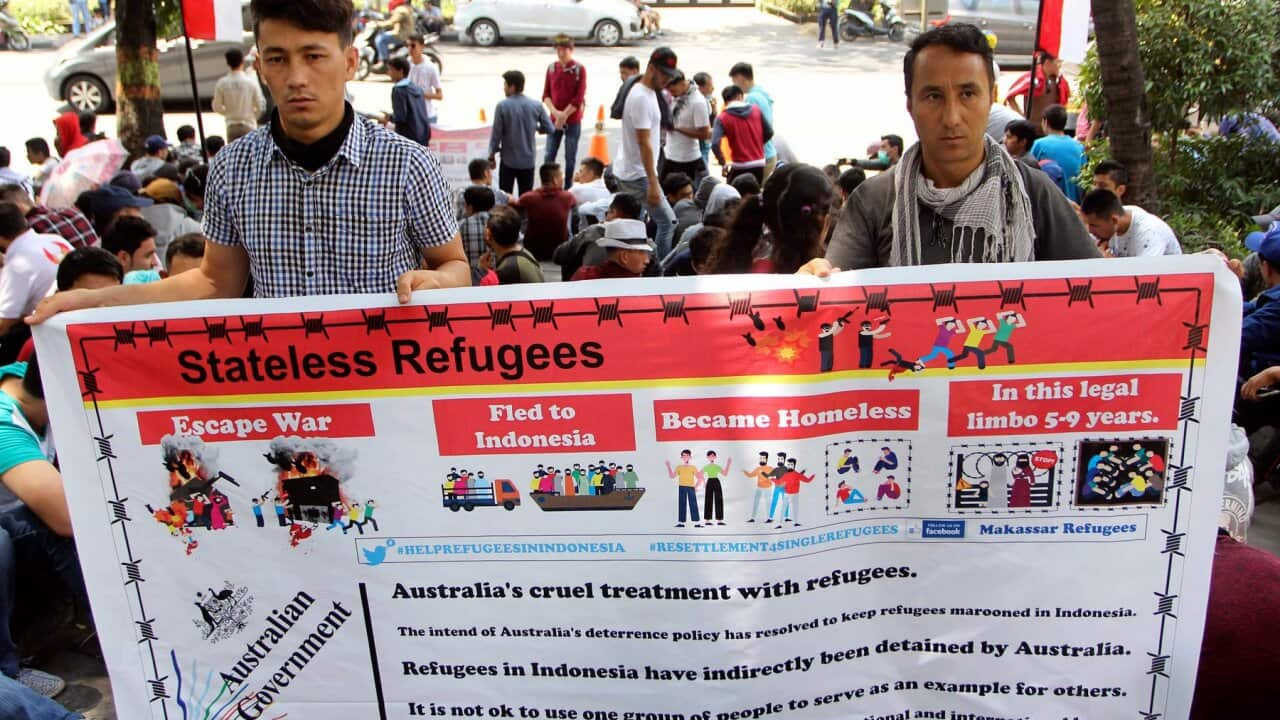Refugees in Indonesia who claim to be the "forgotten" victims of Australia's border protection policies held protests in Indonesian cities on Tuesday, including in front of Jakarta's UNHCR headquarters and at the Australian consulate in Makassar.
that the refugees come from countries including Afghanistan, Sudan, Somalia, Myanmar, Iran and Iraq.
The rally was also held in front of the International Organisation for Migration (IOM) office in Pekanbaru, Riau the day before. The that the refugees demanded an acceleration of their departure to countries of asylum. Similar pressure has come from the Indonesian authorities in the wake of the protest.
Similar pressure has come from the Indonesian authorities in the wake of the protest.

Refugees from various countries hold posters during a protest outside the building that house UNHCR representative office in Jakarta, Indonesia, Tue 20/8/2019. Source: AAP Image/AP Photo/Tatan Syuflana
The Coordinating Ministry for Political, Legal and Security Affairs of Indonesia has urged the UNHCR to immediately look for a solution to the problem of stranded refugees in Indonesia.
"We urge and encourage them to accelerate the process of resettlement or placement in third countries, especially [for] foreign refugees who are in Pekanbaru," , speaking in Pekanbaru.
According to the UNHCR Indonesia website, there are currently around 14,000 refugees registered at the UNHCR office in Indonesia. As of December 2018, some of the refugees come from Afghanistan (55 per cent), Somalia (11 per cent) and Myanmar (six per cent).
Mr Anwar said that the issue raised at the refugees protests in some cities in Indonesia are all the same, which is for UNHCR to accelerate the process of resettlement, and therefore UNHCR must take immediate action because it is their responsibility, not the Indonesian government's.
'They don't have any other choice'
Years of waiting without certainty are also felt in the city of Kupang, East Nusa Tenggara, in eastern Indonesia. One refugee here understands the background of the protest.
"Of course it's not easy to be migrant that doesn't know where you [will] end up," Afghan refugee Asif Pazhwak told SBS Indonesian via text message.
"Well these people are waiting for five to seven years to get resettlement from Australia. You know it's not a short time right?"
Despite a constant request for resettlement in Australia, the that any asylum seekers who registered with UNHCR in Indonesia after 1 July would not be eligible for resettlement in Australia. The move was "designed to stop people flowing into Indonesia".
Asked about this, Mr Pazhwak, who has been living in refugee accommodation in Kupang for the past four years, said that some refugees are aware of the ban, but had no option but to wait.
"Some migrants know that but they don't have [any] other choice," the former IT student said.
"We're not only looking for Australia... we just looking for a safe place to live. Other countries like USA, Canada or etc [are] also fine."
But he also knows that refugees stranded in Indonesia are not the responsibility of US nor Canada.
"That's why we're looking for humanity to save one another from danger," said 30-year-old who is one of about 300 refugees living in Kupang. Mr Pazhwak said the protest needed to happen to push for resettlement as soon as possible, but the refugees in Kupang chose not to protest as in other cities.
Mr Pazhwak said the protest needed to happen to push for resettlement as soon as possible, but the refugees in Kupang chose not to protest as in other cities.

Afghan refugee Asif Pazhwak (R) teaches English as a volunteer at 'Rumah Sejuta Mimpi' in Kupang, East Nusa Tenggara. Source: Asif Pazhwak
"Of course it's necessary to remain to [be] responsible [to] people... We're also human and we have family, dreams," said Mr Pazhwak who wants to be a teacher in whatever country he is resettled in.
"We're not going to protest yet because Kupang is a small city and we need to respect Indonesian government and people too."
'Being a refugee is not easy'
The Afghan refugee, who has a dream to someday reunite with his family in another country, reiterates how difficult it is to live as a refugee in Indonesia, so hard he wants to put it in writing.
"Explaining [about] being refugee is not easy. Maybe when I print out a book [about refugees' lives] you can read it," Asif Pazhwak told SBS Indonesian. "I am noting all of the difficulties a refugee [is] facing.
"But printing here in this situation is not easy. You are not allowed to work [among] many other problems.
"For example I want to continue my study here but I just can't because I'm a refugee and was born in Afghanistan.
"Being refugee is really hard that's why everyday when I wake up in the morning I pray for all people to live in peace."
Mr Pazhwak pleaded for countries to accept the refugees who continue to live in limbo.
"Just open [up] your heart please. Because being refugee is not our choice."

